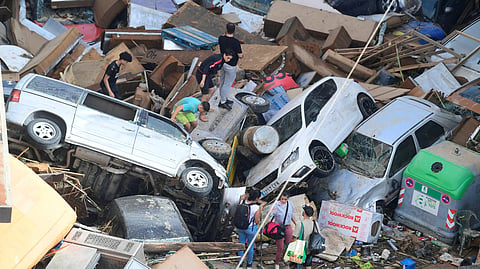
- NEWS
- the EDIT
- COMMENTARY
- BUSINESS
- LIFE
- SHOW
- ACTION
- GLOBAL GOALS
- SNAPS
- DYARYO TIRADA
- MORE

Sedaví, Spain – Spanish rescuers are racing against time to save individuals trapped by the raging waters from catastrophic floods that have claimed at least 95 lives, marking the deadliest flooding disaster in the country in over 50 years. The flooding has tossed vehicles, crippled transportation, and left communities in chaos.
Heavy downpours and fierce winds have battered Spain since the start of the week due to a storm system that developed over the Mediterranean Sea. In some areas, nearly a year’s worth of rainfall fell within hours, causing rivers to overflow and inundate surrounding regions. The coordinating body for emergency services in Valencia reported a provisional death toll of 92, with additional fatalities in neighboring regions of Castilla-La Mancha and Andalusia.
Prime Minister Pedro Sanchez has urged citizens to remain vigilant as the danger remains, announcing three days of national mourning. He emphasized the government's "absolute priority" is to assist the victims, stating, "All of Spain weeps with all of you... We won't abandon you." His sentiments were echoed by King Felipe VI, who expressed devastation over the tragedy and extended heartfelt condolences to the bereaved families.
In the suburb of Sedaví, streets were transformed into a sea of mud and debris, leaving residents to scramble to salvage what they could from their homes, now without water or electricity. In Ribarroja del Turia, workers were trapped overnight as torrents rendered escape impossible. Town councilor Esther Gomez described the situation as frightening, indicating that such floods had not been seen in years.
Meteorological reports from AEMET revealed that the town of Chiva received 491 mm of rain in just eight hours on Tuesday—almost equivalent to an entire year's rainfall. As floodwaters continue to rise, government officials warn that the death toll is likely to increase, citing numerous missing individuals.
Efforts to reach affected communities are being hampered by significant damage to communication networks and flooded roads. Approximately 155,000 homes in the Valencia region remain without power, and energy company Iberdrola has mobilized 500 workers to restore electricity. Additionally, Defence Minister Margarita Robles announced that over 1,000 troops, along with helicopters, are being deployed in response to what has been described as "an unprecedented phenomenon."
The European Union has also stepped in, activating its Copernicus satellite system to coordinate rescue operations and offering to send further assistance through its civil protection mechanism.
Transport links have been severely disrupted, with rail services between Valencia and Madrid suspended for at least the next four days. AEMET has issued a red alert for continued heavy rainfall in southern regions, as forecasters predict the adverse weather will persist.
This disaster marks the deadliest flooding event in Spain since 1973, when at least 150 people were reported dead following severe flooding in Granada, Murcia, and Almeria. Experts attribute the recent storm's severity to a combination of cold air over warm Mediterranean waters, resulting in intense rain clouds. Climate scientists warn that such extreme weather events are becoming more frequent and intense due to climate change, placing significant stress on existing flood defenses and response strategies.
With recovery efforts ongoing and the death toll expected to rise, the impact of these floods is felt deeply across Spain, where the government is pledging to provide all necessary resources to aid recovery and support affected communities.
Spain has declared three days of mourning following this tragic flooding disaster, as the nation comes to terms with the scale of the loss and devastation.
